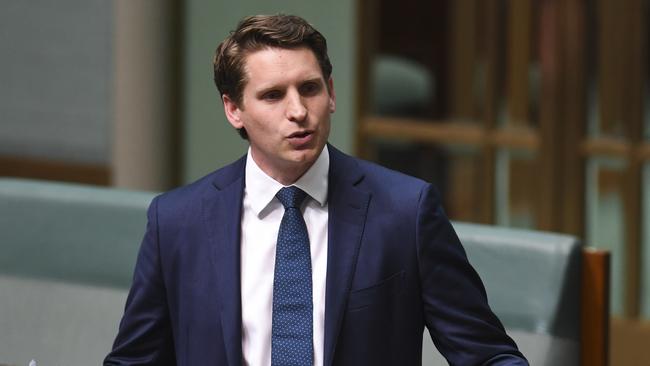Low emergency oil reserves ‘now pose a danger to security’
Australia’s failure to meet emergency oil reserves now poses a national security threat, the IEA has warned.

Australia’s failure to meet emergency oil reserves now posed a national security threat, the head of the government-controlled intelligence and security committee has warned following an international report that confirmed Australia was vulnerable to external oil “supply” shocks.
A report by the International Energy Agency revealed Australia last year had reached its lowest level of emergency supply in almost 20 years and had been “well below” the mandated reserve of a minimum 90-day supply, required under its international obligations, for the past five years.
With political instability in the region increasing, including China’s militarisation in the South China Sea, the chairman of the parliamentary joint committee on intelligence and security, Liberal MP Andrew Hastie, has called for the supply problem to be elevated to a national security issue. “You can have the best military in the world but it’s futile if you can’t fuel it,” Mr Hastie, a former SAS commander, said.
“We need to start looking at Australia’s national security as an ecosystem. We are facing a number of threats at home: terrorism, espionage and foreign interference in our political system.
“The Coalition government is taking decisive action to defend against those threats, but our region is also becoming increasingly uncertain, particularly with the developments in the South China Sea.
“All our liquid fuel is imported — both refined and crude — and so we need to ensure we have the 90-day minimum reserve. Otherwise our dependence on the importation of liquid fuel leaves us incredibly vulnerable to coercion through denial of our shipping lanes and therefore liquid fuel.”
The five-yearly IEA report into Australia’s energy sector, released yesterday, said Australia was vulnerable to “significant external supply shock”.
“The country does not have public stockholdings and does not place a minimum stockholding obligation on its domestic oil industry,” it said.
All IEA countries had an obligation to hold emergency stocks equivalent to 90 days of net imports and be able to contribute to an IEA collective action.
“Australia meets neither obligation,” the report said. “In 11 out of the 12 months of 2012, and for all of 2013 to 2017, end-month stock levels were below the 90-day level. Stock levels as of 1 October, 2017, were equivalent to only 48 days of net imports.
“This was Australia’s lowest reported monthly stock level in terms of days’ cover since 2000.”
The report went on: “In addition to not meeting its international obligations, this situation leaves Australia more vulnerable in the event of a significant external supply shock.
“Although the long supply chain provides Australia with additional time to implement domestic measures in response to a supply shock, low stock levels limit the country’s options for addressing such a disruption.”
Since the international agreement was struck in 1974, IEA countries have been called on for three collective actions where oil supplies globally were threatened. The first was in the build-up to the Gulf War in 1991; the second followed hurricanes Katrina and Rita, which damaged offshore oil rigs, pipelines and oil refineries in the Gulf of Mexico in 2005; and the most recent was in response to the 2011 disruption of oil supplies from Libya.
The report acknowledged that while Australia was the only IEA member country to be a net importer of oil, the federal government had responded in 2016 by enacting a strategy that would return Australia to the required minimum by 2026.
Yet more needed to be done, it said. “The government is now committed to addressing this situation and in June 2016 presented a plan to return to compliance by 2026. Australia has made good progress with the plan’s implementation although it has further work to do.”
Environment and Energy Minister Josh Frydenberg confirmed that as of December, the government had 46.6 IEA-days’ worth of oil stockholdings.
He blamed past Labor governments for inaction. “Australia has been structurally non-compliant with the IEA 90-day oil stockholding since March 2012. Labor had every opportunity to act and did nothing,” he said.
“Australia is making good progress implementing its plan to return to compliance with the 90-day stockholding requirement.
“(We have) a well-functioning domestic petroleum market that is closely integrated into international oil markets. (Our) international oil supply chain is diverse, flexible and robust. This mitigates supply disruption risks as fuel can be sourced from suppliers in other regions.
Mandatory reporting of oil statistics commenced on January 1, with the first reports due to the government this month.



